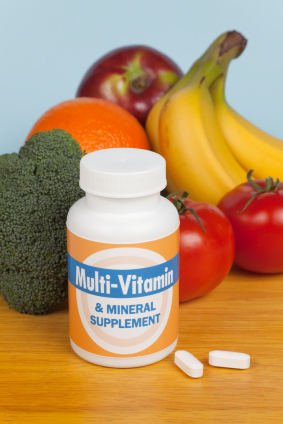What to Look for in a Multivitamin
What to Look for in a Multivitamin
By: Dr. George Obikoya
We all need to take multivitamins. The American Medical Association recently recommended that all Americans should take a daily multivitamin and mineral supplement 1. This is because our diets cannot provide us with all the vitamins and nutritional supplements we need. Yet, with the vast array of vitamins out in the market, it is no wonder that many of us don't know which one to buy. This is despite new labeling laws mandating manufacturers to provide more information on their labels to inform consumers. This information is often too technical for people to understand and can sometimes even be printed too small to read. Here are some useful tips to keep in mind when shopping for vitamins.
The first thing you want to know what the constituents of the vitamins you want to buy are. What additional nutrients do they contain? If they contained the vitamins you are looking for, you should next find out what their percentages of the Recommended Daily Allowance (RDA) are. Vitamins should be at least 100% of the RDA. Minerals except iron, fluoride, phosphorus and electrolytes such as sodium and potassium should be at least 50%. Be sure to look check the mineral content of the product. Many multivitamin preparations do not have sufficient minerals because they occupy too much space.
Do the vitamins meet United States Pharmacopoeia (USP) requirements? Some vitamins only meet the National Formulary criteria, quality control standards currently unavailable for some products. What about dosing? Is the multivitamins supposed to be taken once daily or three times daily? Is the dosing what you want?
Check the individual vitamins in the product. Is Vitamin A from non-toxic beta-carotene, its safest form What about Vitamin D? Is it D2 (synthetic, ergocalciferol) or D3 (natural, cholecalciferol)? This is important because obese individuals may be unable to convert D2 to the active form of vitamin D critical for healthy bones.2 Is Vitamin E in its natural, more useful ("d") forms such as d-alpha tocopheryl acetate or succinate or is its form preceded by "dl" which means it is synthetic.
Does the multivitamin supplement have inorganic oxides that are hardly digestible? Does it contain minerals as citrates, malates, and chelates? Does the multivitamin have iron, particularly in its sufate form that tends to constipate? Check to see if the multivitamins you are planning to buy has herbal extracts. If so, are the extracts good for your health? Do you need to consult your doctor about this? What other things are in the product beside vitamins? Look for artificial colorings and flavors, sugars and artificial sweeteners? Are these things good for you? The sugar content of the multivitamins will be important, for example, for someone that suffers from Diabetes to note.
You can make an informed choice about what vitamin supplement to buy using these tips. Remember that liquid multivitamins absorb 5 times better than do pills. So, take your time to ensure you buy the multivitamin preparation that best suits you.
A good multivitamin is the foundation of health
and nutrition. Take a look at our scientific reviews of many of
the popular brands for factors such as ingredients, areas of improvement,
quality level, and overall value. If you are looking for a high
quality liquid multivitamin, we suggest that you take a look at
the Multivitamin
Product Comparisons.
References:
1. Fletcher RH, Fairfield KM.Vitamins for chronic disease prevention
in adults: clinical applications. JAMA (United States), Jun 19 2002,
287(23) p3127-9.
2. Trang HM, Cole DE, Rubin LA, et al. Evidence that vitamin D3 increases serum 25-hydroxyvitamin D more efficiently than does vitamin D2. Am J Clin Nutr (United States), Oct 1998, 68(4) p854-8.

